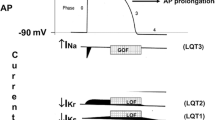Abstract
Patients with congenital long-QT syndrome (LQTS) are at increased risk of ventricular arrhythmias during stressful situations. Large-scale studies have pointed out that affected individuals are particularly at risk in the period following pregnancy (post-partum). This is recognised especially for women with an LQTS type 2. Here, we describe two cases of young women with LQTS type 2, both admitted to our institution with symptomatic torsades de pointes a few weeks after delivery. Both patients carried a mutation in the KCNH2 gene. One patient was nullipara, while the other had had an uneventful previous pregnancy. In both cases treatment with a β-blocker did not prevent life-threatening cardiac arrhythmias. The risk of arrhythmias is thought to gradually decrease to pre-pregnancy values in the nine months after delivery. Considering the difficulties related to continuous monitoring of a patient for such a long period and the desire of these patients to have more children in the foreseeable future, ICD implantation was performed. (Neth Heart J 2008;16:422-5.)
Similar content being viewed by others
References
Schwartz PJ, Moss AJ, Vincent GM, Crampton RS. Diagnostic criteria for the long QT syndrome. An update. Circulation 1993;88:782-4.
Roden DM. Clinical practice. Long-QT syndrome. N Engl J Med 2008;358:169-76.
Jackman WM, Friday KJ, Anderson JL, Aliot EM, Clark M, Lazzara R. The long QT syndromes: a critical review, new clinical observations and a unifying hypothesis. Prog Cardiovasc Dis 1988;31:115-72.
Splawski I, Shen J, Timothy KW, Lehmann MH, Priori S, Robinson JL, et al. Spectrum of mutations in long-QT syndrome genes. KVLQT1, HERG, SCN5A, KCNE1, and KCNE2. Circulation 2000;102:1178-85.
Schwartz PJ, Priori SG, Spazzolini C, Moss AJ, Vincent GM, Napolitano C, et al. Genotype-phenotype correlation in the long-QT syndrome: gene-specific triggers for life-threatening arrhythmias. Circulation 2001;103:89-95.
Conrath CE, Jongbloed RJE, van Langen IM, van Tintelen, Hauer RNW, Robles de Medina EO, et al. Gene-specific distribution of cardiac events in LQTS1 and LQTS2. Neth Heart J 1999;6:254-9.
Wilde AA, Jongbloed RJ, Doevendans PA, Duren DR, Hauer RN, van Langen I, et al. Auditory stimuli as a trigger for arrhythmic events differentiate HERG-related (LQTS2) patients from KVLQT1-related patients (LQTS1). J Am Coll Cardiol 1999;33:327-32.
Seth R, Moss AJ, McNitt S, Zareba W, Andrews ML, Qi M, et al. Long QT syndrome and pregnancy. J Am Coll Cardiol 2007;49:1092-8.
Tan HL, Alings M, Van Olden RW, Wilde AA. Long-term (sub-acute) potassium treatment in congenital HERG-related long QT syndrome (LQTS2). J Cardiovasc Electrophysiol 1999;10:229-33.
Rashba EJ, Zareba W, Moss AJ, Hall WJ, Robinson J, Locati EH, et al. Influence of pregnancy on the risk for cardiac events in patients with hereditary long QT syndrome. LQTS Investigators. Circulation 1998;97:451-6.
Author information
Authors and Affiliations
Corresponding author
Additional information
Department of Cardiology, Academic Medical Center, University of Amsterdam, Amsterdam, the Netherlands
Department of Cardiology, Red Cross Hospital, Beverwijk, the Netherlands
Department of Cardiology, Jeroen Bosch Hospital, 's Hertogenbosch, the Netherlands
Correspondence to: P.G. Meregalli
Department of Cardiology, Academic Medical Center, University of Amsterdam, PO Box 22660, 1100 DD Amsterdam, the Netherlands
Rights and permissions
About this article
Cite this article
Meregalli, P.G., Westendorp, I.C.D., Tan, H.L. et al. Pregnancy and the risk of torsades de pointes in congenital long-QT syndrome. NHJL 16, 422–425 (2008). https://doi.org/10.1007/BF03086191
Issue Date:
DOI: https://doi.org/10.1007/BF03086191




